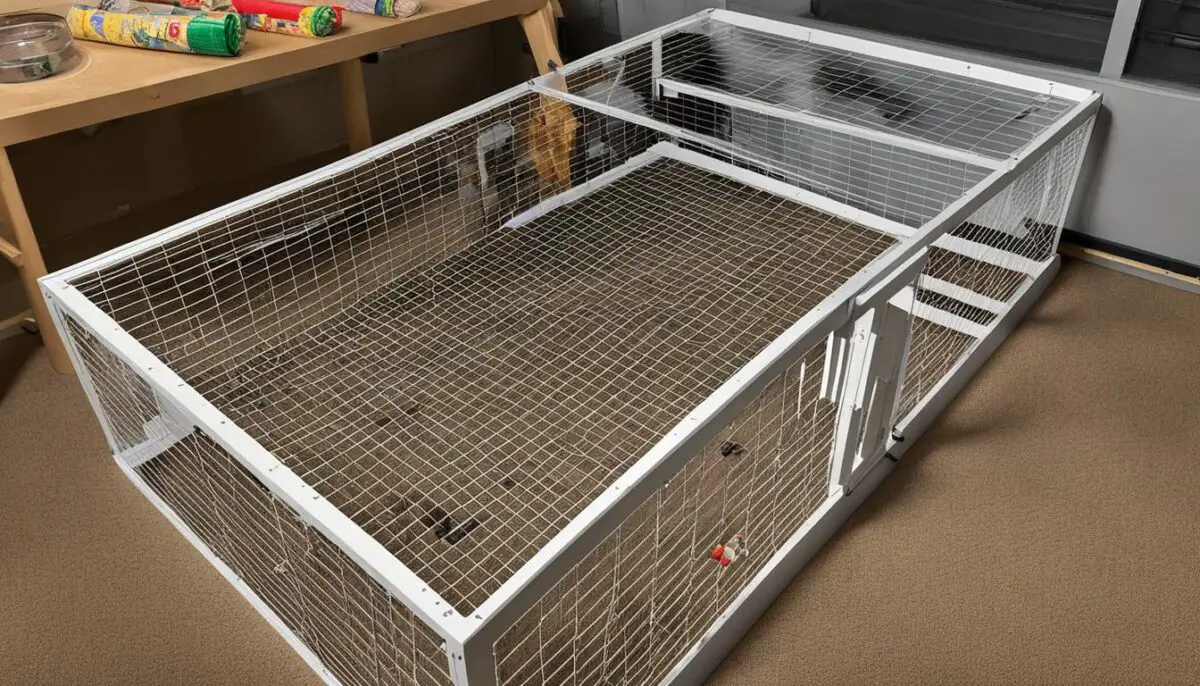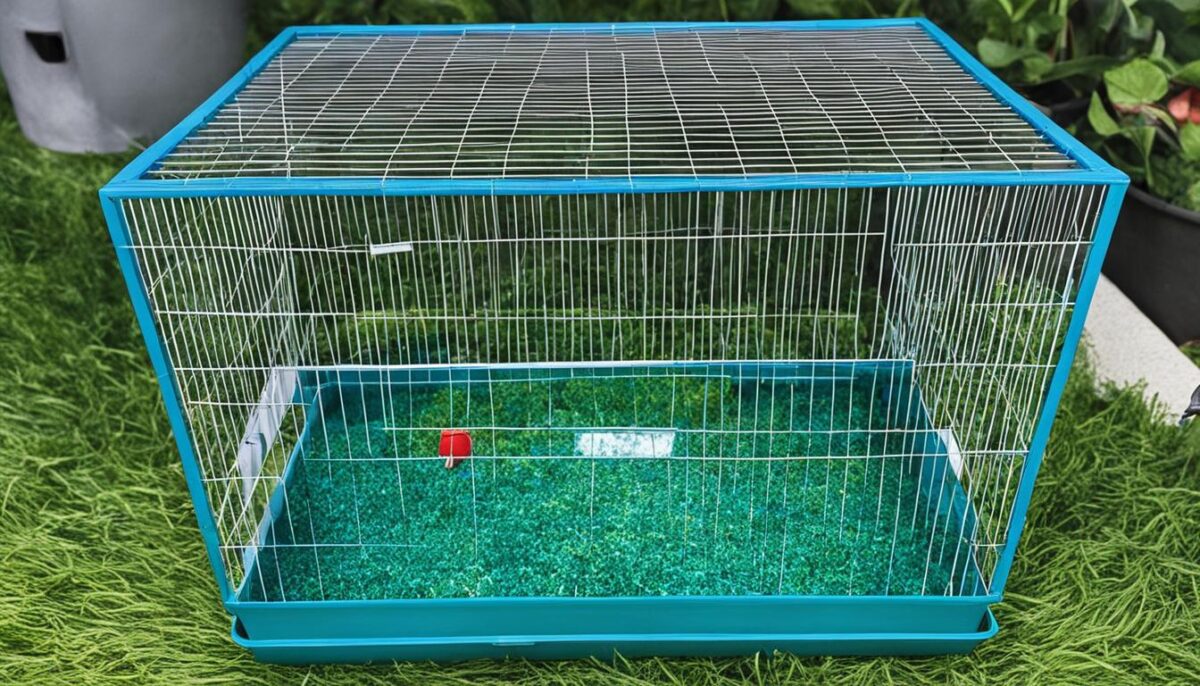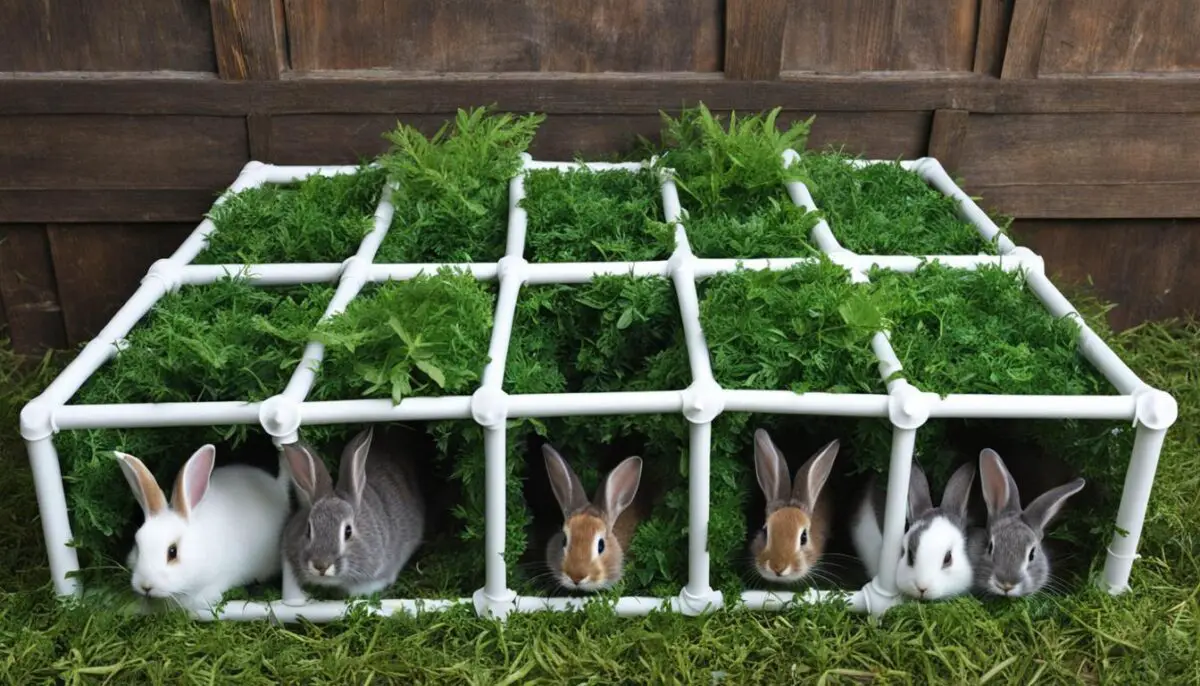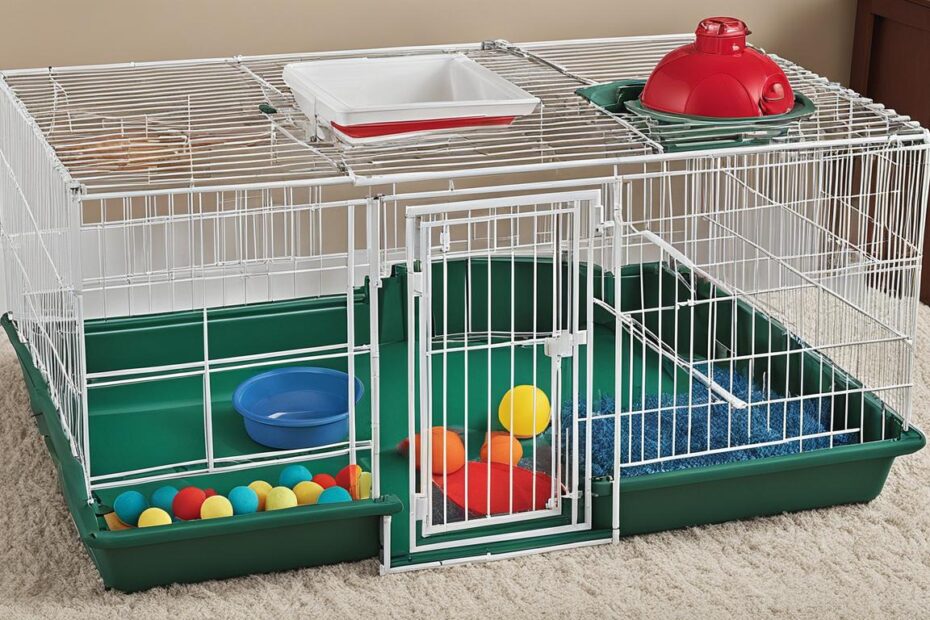Welcome to our guide on creating a comfortable and enriching environment for your pet rabbit! In this article, we will explore the essential supplies you need to include in your rabbit’s cage to ensure their well-being and happiness. Rabbits have unique needs, both physical and mental, and providing the right items in their cage is crucial for their overall health.
When setting up your rabbit’s cage, it’s important to consider their comfort and stimulation. By creating a space that meets their needs, you can help them thrive in their environment. Let’s dive into the essential supplies that your rabbit’s cage should have:
Key Takeaways:
- Water and food dishes are essential for providing your rabbit with proper hydration and nutrition.
- A litter box helps in training your rabbit and keeps their living area clean.
- Rabbit-safe toys and hidey houses provide mental stimulation and a sense of security.
- Hay racks ensure a constant supply of fresh, quality hay for your rabbit’s diet.
- Consider optional additions like tunnels and platforms to enhance your rabbit’s environment.
The Importance of a Spacious Cage for Your Rabbit
When it comes to providing a comfortable home for your furry friend, the size of the rabbit cage is of utmost importance. A spacious environment is essential to ensure your rabbit’s well-being and happiness. Not only does it allow them to stretch out and move freely, but it also enables them to exhibit their natural behaviors.
A cage that is too small can lead to numerous problems, including stress, behavioral issues, and health problems. Rabbits need ample space to explore, hop, and play. It allows them to exercise their muscles, maintain a healthy weight, and keeps them mentally stimulated.
When setting up your rabbit’s cage, make sure it meets the minimum size requirements based on the breed and size of your rabbit. Providing a spacious cage gives your bunny the opportunity to roam around and enjoy their living space to the fullest.
It’s important to remember that rabbits are active animals and require enough space to engage in their natural behaviors, such as running, jumping, and standing on their hind legs. A cramped cage can limit their movement and cause unnecessary stress, leading to potential health issues.
A spacious cage setup also facilitates bonding with your pet. It provides enough room for you and your rabbit to interact, play, and build a strong bond based on trust and mutual understanding.
Remember, a spacious cage is an investment in your rabbit’s well-being. It allows them to live a happy, active, and joyful life. Ensure your rabbit has plenty of space to hop, explore, and relax within their home.

Benefits of a Spacious Rabbit Cage:
- Allows your rabbit to stretch out and move around freely
- Encourages natural behaviors and exercise
- Reduces stress and behavioral problems
- Prevents potential health issues caused by limited movement
- Facilitates bonding and interaction with your rabbit
By providing a spacious cage for your rabbit, you are creating an environment that promotes their physical and mental well-being. It is an essential aspect of responsible rabbit ownership and ensures your furry friend lives a happy, healthy, and fulfilling life.
| Cage Size Guidelines | Rabbit Breed | Minimum Cage Size |
|---|---|---|
| Small to Medium | Dutch, Netherland Dwarf, Mini Lop | 24″ x 36″ |
| Medium to Large | Lionhead, Mini Rex, Flemish Giant | 30″ x 36″ |
| Giant | English Lop, Giant Chinchilla, Checkered Giant | 36″ x 48″ |
Providing Water, Food, and Litter in the Rabbit Cage
When setting up your rabbit’s cage, it is essential to ensure they have access to fresh water, proper food, and a designated litter area. These provisions are crucial for your rabbit’s health and hygiene.
Water Dispenser:
Make sure your rabbit always has access to fresh water by providing a sturdy water dispenser in their cage. You can choose either a dish or a hanging bottle with a sipper tube. Ensure that the water dispenser is easily accessible for your rabbit, and check it daily to ensure a continuous supply of clean water.
Food:
Along with water, providing the right food is essential for your rabbit’s overall well-being. Place a dish in the cage for pellet food, which is specifically formulated for rabbits. Additionally, offer a variety of fresh vegetables and herbs to enhance their diet and provide essential nutrients. Ensure that any fresh food is washed thoroughly before serving it to your furry friend.
Litter Box:
Setting up a litter box in one corner of the rabbit cage is essential for both training purposes and easy cleaning. Choose a litter box that is of an appropriate size for your rabbit and place it in a corner where they naturally tend to do their business. This helps in litter box training and prevents accidents in other parts of the cage. Use a litter that is safe for rabbits and avoid toxic materials that may be harmful to their health.
By providing a water dispenser, the correct food, and a litter box in your rabbit’s cage, you are ensuring their basic needs are met and promoting a clean and healthy living environment for them.

Enriching the Rabbit Cage with Toys and Accessories
Keeping your rabbit happy and engaged is essential for their overall well-being. By providing them with a variety of toys and accessories in their cage, you can ensure that they stay mentally stimulated and physically active.
There are several rabbit-safe toys that you can introduce to your furry friend’s cage. These include:
- Cardboard boxes: Rabbits love to explore and chew on cardboard boxes, providing them with both mental stimulation and entertainment.
- Tunnels: Adding tunnels to the cage allows your rabbit to engage in natural behaviors like hopping and burrowing.
- Puzzle toys: These toys challenge your rabbit’s problem-solving skills and keep their mind sharp.
- Chewable accessories: Willow balls and apple wood sticks are great options for keeping your rabbit’s teeth healthy and satisfying their natural chewing instincts.
Creating an enriching environment within the rabbit cage is also important. Consider adding tunnels and platforms that allow your rabbit to explore and climb. These additions provide them with opportunities for exercise and mental stimulation.
Furthermore, offering hidey houses or shelters in the cage can give your rabbit a sense of security and privacy. Rabbits are prey animals and sometimes need a safe place to retreat to when they feel scared or overwhelmed.
Remember, always supervise your rabbit when introducing new toys and accessories to ensure their safety. Remove any items that show signs of wear or damage, as they may pose a risk to your furry friend.

2. Platforms for Rabbit Cage
Platforms or elevated surfaces not only provide extra space in the cage but also encourage rabbits to climb and jump. Adding platforms made of sturdy materials like wood or plastic allows your rabbit to exercise their leg muscles and engage in vertical exploration. Ensure that the platforms are secured properly to avoid any accidents.
3. Chewable Accessories for Rabbit Cage
Rabbits have a natural instinct to chew, and providing them with chewable accessories is essential for their dental health and mental stimulation. Willow balls and apple wood sticks are excellent options for rabbits to satisfy their chewing instincts. These accessories are not only safe but also promote healthy teeth and gums.
“Adding tunnels, platforms, and chewable accessories to your rabbit’s cage can significantly enhance their environment and overall well-being.”
These optional additions can offer mental stimulation, physical exercise, and a sense of security for your furry friend. When implementing these additions, ensure they are made from safe materials, are properly secured, and do not impede your rabbit’s movement within the cage.
By creating an enriched and dynamic living space for your rabbit, you can help them lead a happy, healthy, and content life.
Regular Health Check-ups and Monitoring Behavior
Regular veterinary check-ups are crucial in ensuring the overall health and well-being of your beloved rabbit. Just like any other pet, rabbits also require proper healthcare and attention from qualified veterinarians who specialize in their unique needs. By scheduling regular check-ups, you can ensure that your rabbit receives the necessary preventative care and timely treatment.
Importance of Rabbit Health Check-ups
While rabbits are generally known for their resilience, it is important to remember that they can still be susceptible to various health issues. Regular check-ups help the veterinarian monitor your rabbit’s health, identify any potential problems, and take proactive measures to prevent more serious conditions from developing.
During the check-up, the veterinarian will conduct a thorough examination of your rabbit, checking for signs of illness or injury. They will assess their overall body condition, listen to their heart and lungs, examine their eyes, ears, and teeth, and palpate their abdomen to check for any abnormalities. By doing so, the veterinarian can detect any health issues early on and provide appropriate treatment.
Additionally, the veterinarian may recommend vaccinations to protect your rabbit from common diseases, such as rabbit viral hemorrhagic disease (RVHD) or myxomatosis. These vaccinations can help safeguard your rabbit’s health and prevent potentially life-threatening illnesses.
Monitoring Your Rabbit’s Behavior
Aside from regular check-ups, it is important to closely monitor your rabbit’s behavior at home. Rabbits are known for their subtle behavior changes, which can often be an indication of underlying health issues. By paying attention to their behavior patterns, you can detect any changes early and seek veterinary advice if necessary.
Key behavior changes to watch out for include:
- Reduced appetite or sudden weight loss
- Changes in water consumption
- Lethargy or decreased activity levels
- Aggression or sudden temperament changes
- Increased hiding or isolation
- Excessive grooming or fur loss
- Digestive problems, such as diarrhea or constipation
If you notice any of these behaviors or have concerns about your rabbit’s health, it is important to consult with a veterinarian who specializes in rabbit care. The veterinarian can provide guidance, diagnose any underlying conditions, and recommend appropriate treatment options.
Rabbit Health Check-up Schedule
As a general guideline, it is recommended to schedule a health check-up for your rabbit at least once a year. However, rabbits have individual needs, and certain factors, such as age or existing medical conditions, may require more frequent visits. By consulting with a veterinarian, you can determine the most appropriate check-up schedule for your furry friend.
Remember, the well-being of your rabbit depends on regular veterinary care and close monitoring of their behavior at home. By staying proactive and attentive, you can ensure your rabbit remains healthy, happy, and full of vitality.
| Veterinary Check-up Benefits | Monitoring Behavior Benefits |
|---|---|
|
|
Conclusion
In conclusion, providing the right supplies and creating an enriching environment in your rabbit’s cage is crucial for their overall health and happiness. By following the guidelines outlined in this article, you can ensure that your furry friend has all the necessary essentials for a comfortable and fulfilling life.
Remember to include water and food dishes, a litter box, rabbit-safe toys, hidey houses, hay racks, and optional additions such as tunnels and platforms. These items will help cater to your rabbit’s physical and mental stimulation needs.
Additionally, regular health check-ups and monitoring your rabbit’s behavior are essential for their well-being. Schedule annual veterinary check-ups and pay attention to any changes in eating habits, activity levels, or unusual behavior. By taking care of their needs and seeking professional help when necessary, you can ensure that your rabbit leads a healthy and happy life.
So, provide your rabbit with a loving and enriching environment, and enjoy the joy and companionship they bring to your life as a beloved pet!
FAQ
What are the essential supplies for a rabbit cage?
The essential supplies for a rabbit cage include water and food dishes, a litter box, rabbit-safe toys, hidey houses, hay racks, and optional additions such as tunnels and platforms, chewable accessories, and regular health check-ups.
How important is the size of a rabbit cage?
The size of a rabbit cage is crucial. A cage that is too small can lead to stress, behavioral problems, and health issues. Rabbits need ample space to feel comfortable and exhibit their natural behaviors.
What should I provide for water, food, and litter in a rabbit cage?
Provide your rabbit with fresh water in a sturdy, easily accessible dish or a hanging bottle with a sipper tube. Offer a dish for pellet food and provide a variety of fresh vegetables and herbs. Set up a litter box with safe litter material to train your rabbit and make cleaning easier.
How can I enrich my rabbit’s cage with toys and accessories?
You can provide rabbit-safe toys such as cardboard boxes, tunnels, puzzle toys, and chewable accessories like willow balls or apple wood sticks. Include hidey houses or shelters where your rabbit can retreat if they feel scared or need privacy.
What is the role of hay in a rabbit’s diet and do I need hay racks?
Hay is crucial for a rabbit’s diet. Provide a hay rack in the cage to keep the hay clean and dry. This ensures that rabbits have access to a constant supply of fresh, quality hay, which helps maintain their intestinal health and prevents blockages.
Are there any optional additions to enhance my rabbit’s cage?
Yes, you can consider adding tunnels and platforms to provide more opportunities for physical activity and exploration. Chewable accessories like willow balls or apple wood sticks can satisfy your rabbit’s natural chewing instincts and help keep their teeth healthy.
How important are regular health check-ups and monitoring behavior?
Regular veterinary check-ups are important to ensure your rabbit’s overall health. Schedule check-ups at least once a year and monitor your rabbit’s eating habits, activity levels, and behavior to detect any potential health issues early on. Seek professional help if you have concerns.


